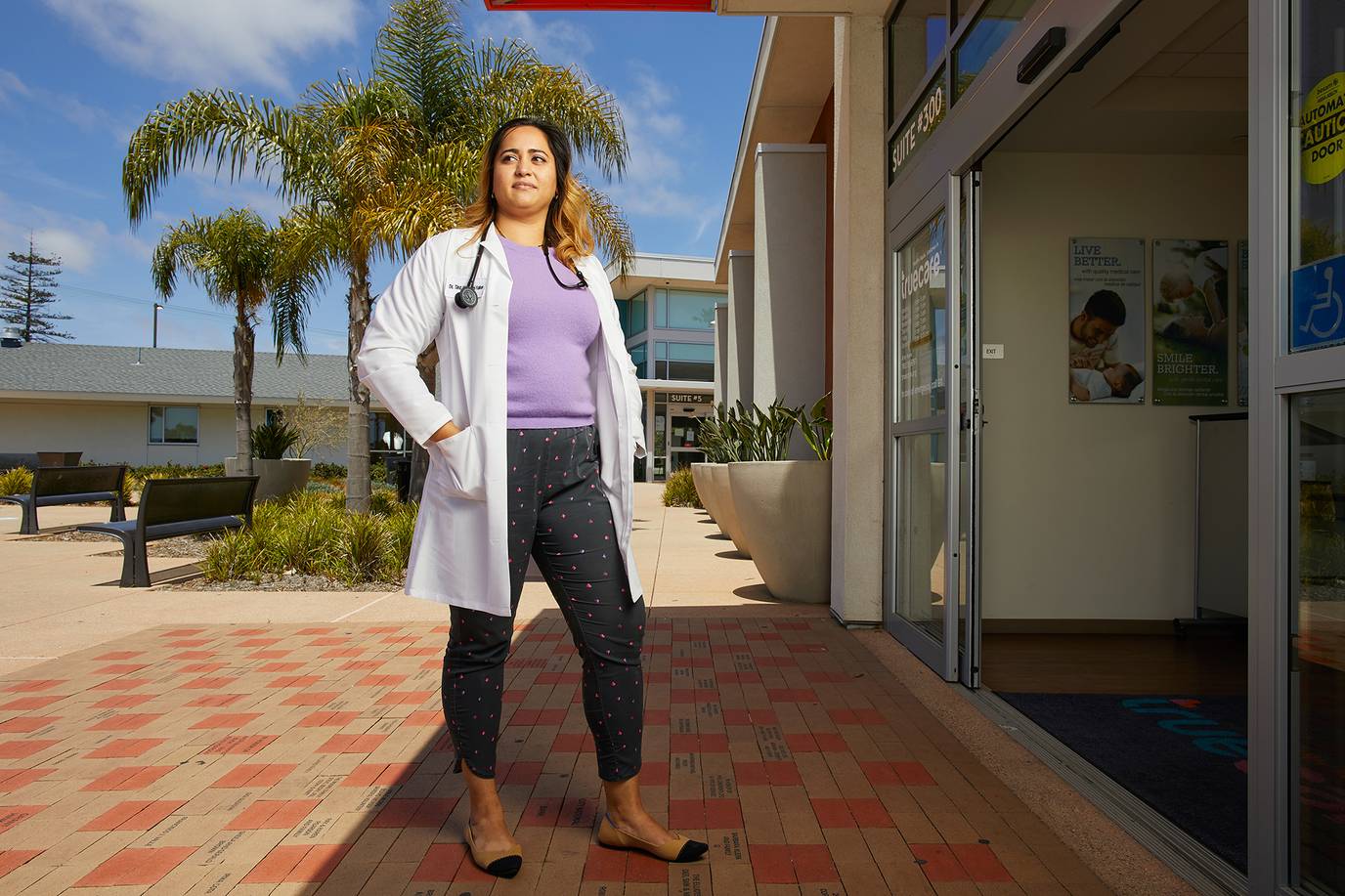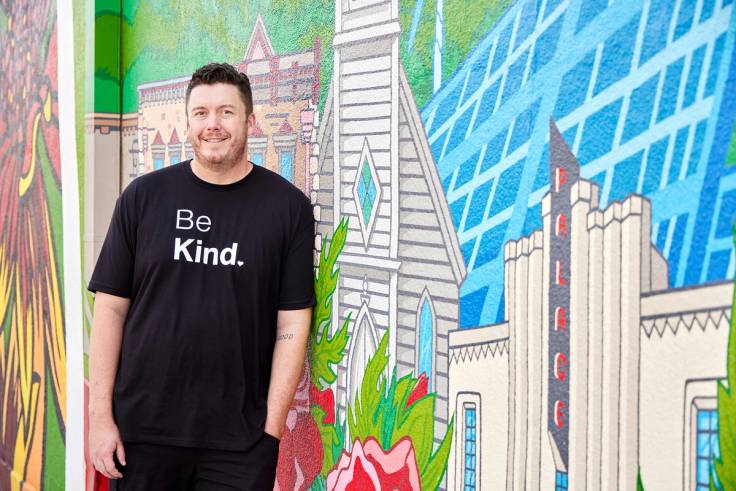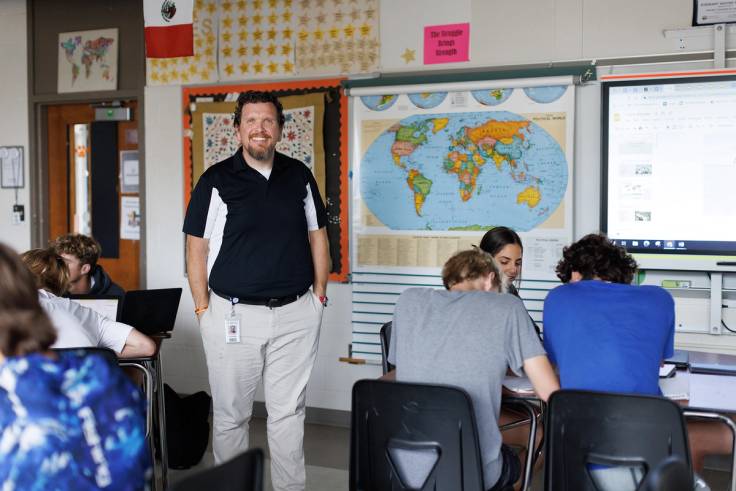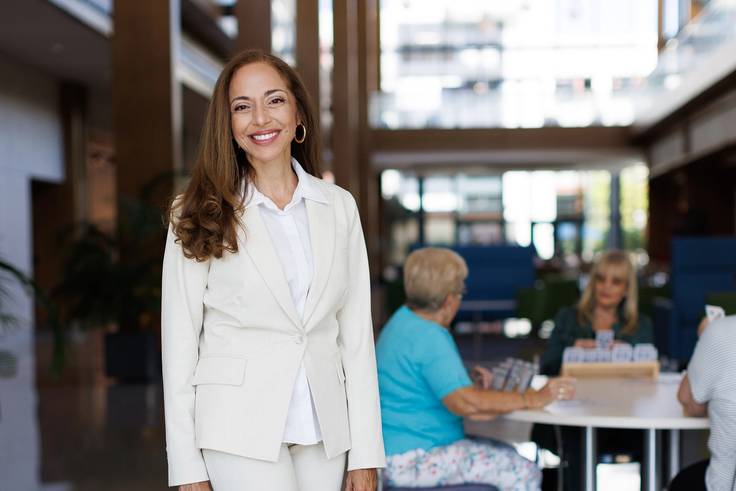The Ripple Effect
June 29, 2022
By Adrienne Egolf

When you support financial aid at Rollins, you not only create opportunity for one student but for all the lives and communities that student goes on to impact.
Growing up on the island of St. Croix, now-pediatrician Tina Udhwani Fallon ’12 knew she’d likely leave home for college. It was common to go elsewhere for a high-quality education, and she’d had her sights set on this goal for most of her life. But in the wake of Hurricanes Irma and Maria, the reality of that dream moved further out of reach as her parents struggled financially.
“The island was really suffering,” she remembers. “There was a big concern about if we’d be able to afford to send me to college—just room and board, let alone tuition.”
So when Fallon got word that she’d earned a need-based scholarship from Rollins, plus qualified for a financial aid package that would cover the remainder of her expenses, it was one of her best days yet.
“I am 32 now,” she says, “and I’m managing a five-clinician office in Oceanside, California, where there’s a lot of need for taking care of the community. Our work has such a massive impact on so many people. My scholarship to Rollins was like a ripple effect. Had I not received that money, I wouldn’t have attended UCF medical school and be able to help the people I do today. My whole life would be completely different.”

Fulfilling Need
The question of paying for college was a burden that weighed on Jordan Bartlett ’06 throughout his senior year of high school. A baseball player, he knew Rollins had a strong athletics program and the academic reputation to match—but he wasn’t sure he’d be able to attend even if he was accepted.
“I wasn’t able to afford Rollins outright,” he explains. “For me, access was a huge part of what my scholarship offered. Rollins was the school I wanted to go to, and access to grants and financial aid was the only reason I was able to attend.”
He’s not alone. According to the Office of Financial Aid, more than 95 percent of Rollins students received some sort of financial aid or scholarship in 2021, with the average aid package falling just over $42,000. More than 20 percent of those students received Pell Grants, which are awarded to students who demonstrate exceptional financial need.
“Helping families find the funding needed is a huge relief for them,” says Steve Booker, associate vice president of enrollment and director of financial aid. “You can see the weight coming off their shoulders and they’re able to focus on their academics.”
Booker says that over the past 10 years, he’s seen the number of students applying for financial aid increase by 8 percent, a trend that’s happening not only at Rollins but throughout higher-education institutions across the U.S.
According to research compiled by The College Board, between 1990 and 2020, inequality in family incomes has increased, with income growing fastest for those in the highest brackets. The average income increased by 57 percent for the top quintile of families while increasing only by 12 percent for the lowest quintile. So it’s more essential than ever to narrow the gap in college affordability that will allow deserving students like Bartlett—and the 50 percent of students at the College who receive need-based aid—to attain a Rollins education and carry that investment forward.
Today, Bartlett runs Doing Good Works, a certified B Corp that provides resources and opportunities for young people aging out of foster care. The company operates a full-service print, promotional merchandise, and packaging company based on a 10/20/30 model, where 10 percent of profits fund programs for foster youth, 20 percent of employee hours are in service of the community, and 30 percent of employees have been impacted by the foster system. He says none of it would be possible without his education from Rollins.
“A lot of people who can’t afford a school like Rollins but who receive a scholarship or financial aid are going to go back into those communities after they graduate,” he explains. “Rollins had a huge impact on what I’m doing now. When you give people an opportunity to see things in a different way, it has an exponential impact on the world.”

Essential Experience
For Bartlett and many students, a scholarship means more than just tuition. It represents a full, well-rounded college experience where he was able to take advantage of the personalized learning environment and opportunities to forge meaningful relationships.
“It was the first time I lived out of my parents’ house and developed independent skills,” he says. “Having a scholarship meant I didn’t have to work a full-time job while in school so I was able to make friends and experience everything Rollins had to offer.”
Thanks to her academic scholarship through a partnership with the Boys & Girls Club, Ashley Williams ’18 ’22MPH was able to maximize her time at the College through service-based learning and study abroad programs.
“I studied abroad in London, and I did a field study in the Dominican Republic that was all about water sanitation and health,” says Williams, a community health specialist at Walmart Specialty Pharmacy who just graduated from Rollins’ master’s of public health program.
It turns out that these types of immersive experiences are not just enriching in the moment—they prove essential for lifelong success. According to the Association of American Colleges & Universities, liberal-arts-related skills and civic- and community-mindedness are essential to employers. Research by the organization has found activities that deepen students’ four-year experience and encourage mindsets like work ethic and persistence impact their success in the workplace.
Meanwhile, a recent Gallup-Purdue University study found that very few students have access to these deep, valuable experiences that help prepare them for a successful, impactful career. The poll looked at six key experiences—things like meaningful mentorship, experiential learning and faculty support—and only 3 percent of students said they’d had all six. The focus on these experiences, and the commitment to providing access to them, is what sets Rollins apart. For example, each year, the Gateway Fellows program gives students access to fully funded internships with some of the world’s most prestigious companies and organizations, funding 47 scholarships to date. And though numbers have dropped in recent years due to COVID-related travel restrictions, up to 80 students a year have received study abroad scholarships in the past. For the 2021-22 academic year, 66 percent of Tars in a study abroad program had scholarship support.
Stewart Parker ’02, a history teacher at Winter Park High School who was named the 2020-21 Teacher of the Year, can see the through line clearly. As the first Cornell Scholar (now the Alfond Scholars program), he received a full scholarship that allowed him the freedom to complete a yearlong, unpaid teaching internship his senior year.
“The educator I am is definitely a result of my education at Rollins,” he says. “And that is 100 percent a result of the scholarship I received. The focus on service learning and engagement and opportunity are things that I bring into my classroom. I learned to ask, ‘What can we do as citizens to make a better world?’ Still 20 years later, I think about those things. How can I help my students achieve their goals because I was given that scholarship? What can I do to help them—because I was given a lot. The College instills a civic-mindedness that never goes away.”

Lifelong Impact
When the pandemic was at its height in Central Florida, the Senior Resource Alliance was there to address the needs of the vulnerable. The organization, led by CEO Karla Radka ’12, worked with local restaurateurs to provide meals to more than 600,000 people from April 2020 to January 2021.
“If they were a senior citizen and they were hungry,” says Radka, “then we fed them during the pandemic.”
This is just the latest milestone in her long career of nonprofit work and difference-making in Central Florida. As the founder and executive director of Public Allies, she led a program to place young people in yearlong positions at local nonprofits. As vice president of Community Based Care, she led initiatives supporting foster care, adoption, and mentoring. As chief operating officer of Goodwill Industries, she helped steward a workforce of 1,250 employees alongside a mission to serve the homeless population and help people find jobs. Her impact on the lives of Central Floridians is immeasurable.
“When you heal a family, you heal the world,” she says.
Radka, who attended Rollins thanks to a scholarship from the Edyth Bush Foundation, says her ability to have this impact is directly connected to her education.
“I believe that funding opportunities for scholarships and helping someone with their education is transformational,” she says. “You are equipping future leaders with the right tools so in turn they can better societies.”
The evidence to support Radka’s perspective is clear. Whether it’s through a B Corp dedicated to equitable employment and charitable giving, a commitment to advancing public health, a career educating future leaders and changemakers, a lifetime of nonprofit service, or a medical practice that serves marginalized communities, the lives of Rollins’ scholarship and financial-aid-funded students ripple outward in ways that result in stronger communities, healthier children, and a safer world.
“I love helping parents raise their children and keep their families healthy,” says Fallon, reflecting on her work as a general pediatrician.
She says that though she always saw herself in medicine, it was the Rollins College Conference (RCC) course on chemistry she took her first year that steered her toward community service by giving her the opportunity to do volunteer work for course credit.
And today, it’s the people-focused parts of her job that stand out the most—like helping immigrant families navigate cultural differences and supporting her teenage patients.
“They’ve been struggling,” she says. “There’s a lot of fear of the future right now. Which is something that I felt around the same age—fear of what was going on with the island, where I would end up. Now, my role is to keep people in good spirits and help them be the best version of themselves. My scholarship at Rollins allowed me to go to a great college without putting me into massive debt. And I turned around and gave it right back to my community.”
Read More
May 22, 2024
Earth Charter International Conference Held at Rollins
In April, Rollins played host to the fifth annual Earth Charter Conference, a three-day event focused on education for sustainability and global citizenship and for planetary well-being.
March 18, 2024
The Meaning of a Good Life
After attending seven colleges across three decades, Eric Reichwein ’18 discovered Rollins’ Professional Advancement programs and the quality of life he’d always wanted.
March 14, 2024
How I Advanced My Career: Eric Reichwein ’18
Find out how Eric Reichwein ’18 leveraged the personalized learning environment and top-ranked reputation of Rollins’ Professional Advancement programs to finish his bachelor’s degree and build the life and career he’s always dreamed of.
